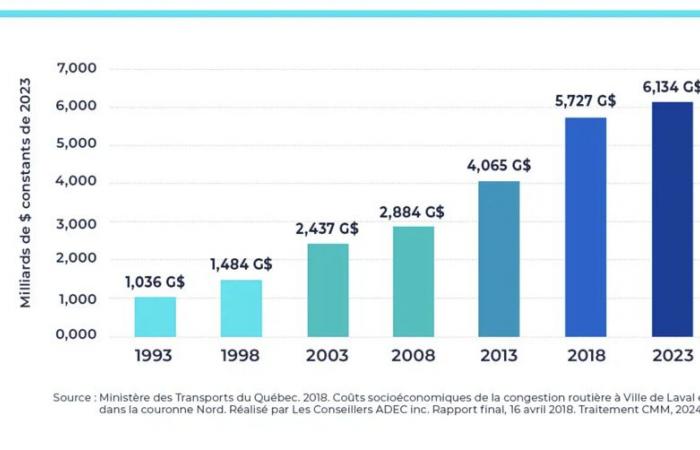The road congestion bill now exceeds six billion and could even reach ten billion by 2030, worries the Montreal Metropolitan Community (CMM), at a time when everything indicates that traffic is returning to its pre-pandemic levels.
Published at 2:45 p.m.
This is what we learn in a new opinion from the Greater Montreal Observatory of the organization representing 82 municipalities, published this Tuesday. It highlights that last year, “the total costs of congestion in the metropolitan area reached $6.1 billion, which represents 2.1% of the region’s GDP.”
In total, “these costs have increased sixfold in 30 years and have more than doubled since 2008,” the CMM continues. “If the pre-pandemic trend continues, congestion in the Montreal metropolitan area could cost $10 billion by 2030,” the experts write.
The organization was responding to a question asked last week by Qub Radio host Isabelle Maréchal, who had denounced that the economic cost of road congestion had not been updated for several years, as of 2018.
From the beginning of September, The Press had reported that traffic on Greater Montreal roads is back to pre-pandemic levels, even exceeding this symbolic threshold in some areas. Already in 2023, traffic levels were fluctuating between 90% and 100% of pre-pandemic volume.
According to a report from the firm INRIX, cited by the CMM, the Montreal region currently ranks second among the most congested Canadian cities, and 30the world ranking, “with an annual average of 57 hours of time lost per motorist in 2023”.
“This result is only 4% lower than in 2019 and 20% higher than in 2022,” it also says, adding that the reality is “a significant loss of time, stress, increased fuel consumption and greenhouse gases that cause climate change, affecting the quality of life of the population.”
Solution: public transport
The report also reiterates that the solution involves the development of structuring collective transport systems.
“For a sustainable reduction in congestion and its costs, substantial investments are necessary in the development of public transport provision and the maintenance of the existing network, in order to support planning and regional development efforts,” the organization maintains.
The most recent traffic data from the Department of Transportation is from April, so it is impossible to put a precise figure on congestion. However, we do know that in May 2024, the average number of Canadians commuting to work on a regular basis was 16.5 million per day. This is a significant jump of 585,000 from May 2023.
According to Statistics Canada data, this represents a clear upward trend after the lows of 2020 and 2021. Of the 16.5 million people on the road, more than 80% use cars as their mode of transportation. And they are mostly alone in the car.







